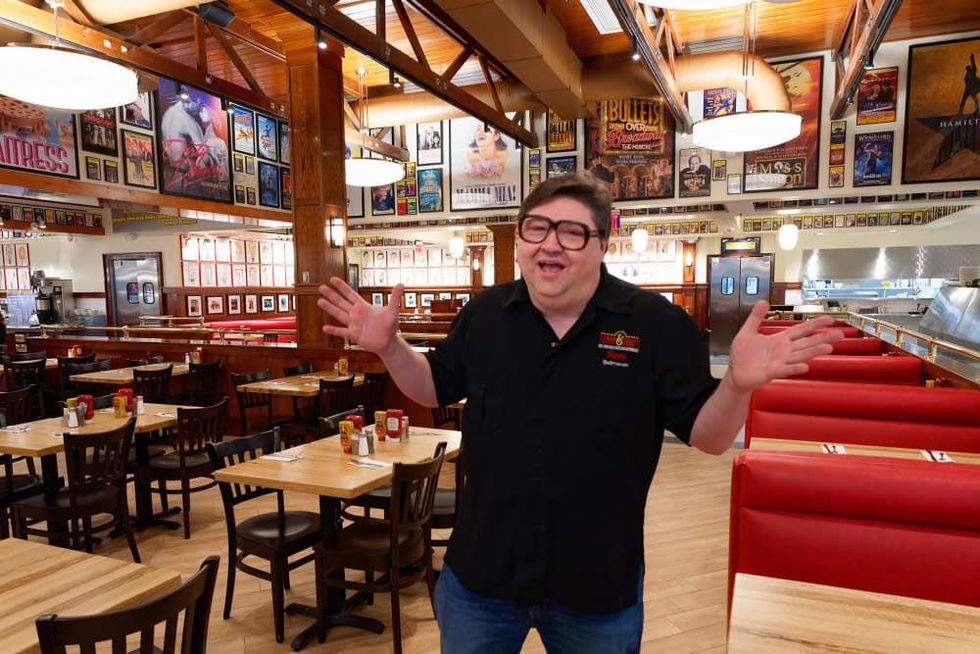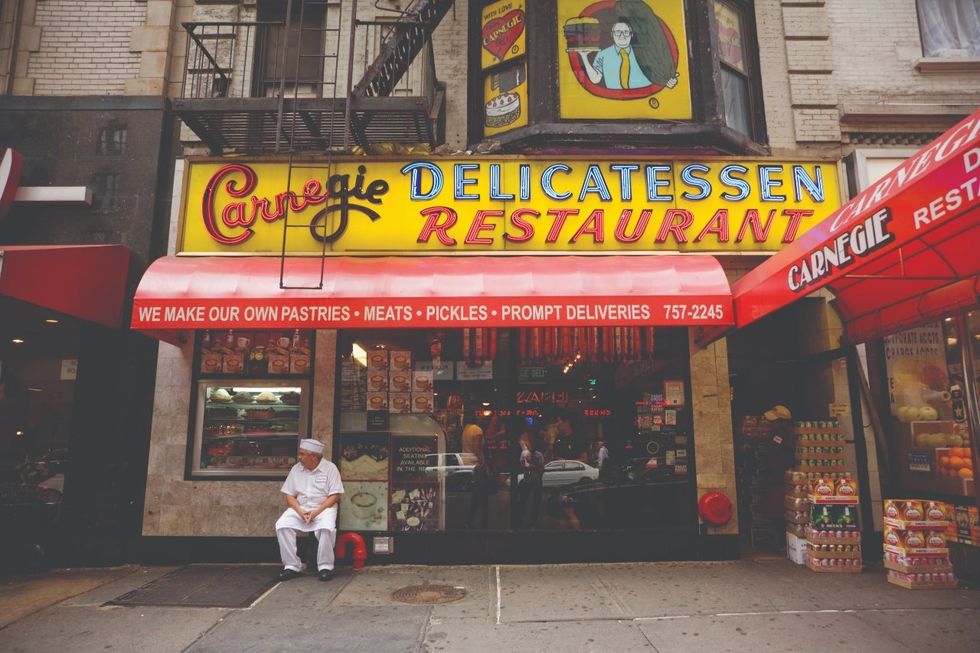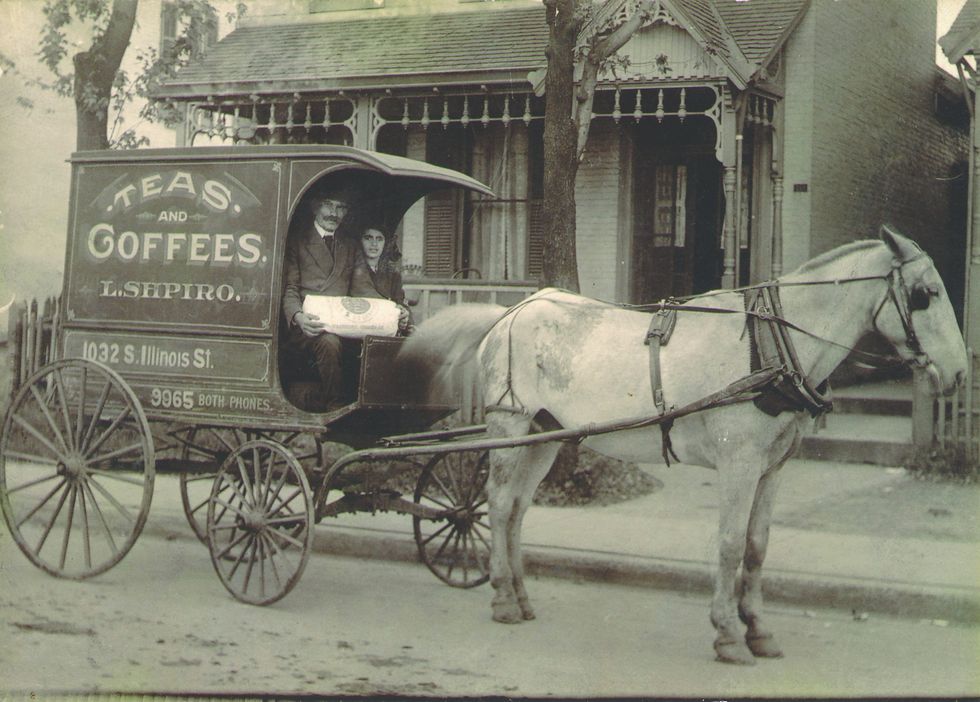delis for dummies with ziggy
Ken Hoffman schmoozes with Ziggy Gruber about a delish new deli exhibit, his hot dog obsession, and his 'ridiculous' burgers
I guess we’ll start by explaining the name of the exhibition about the history of Jewish restaurants in America currently at the Holocaust Museum Houston: “I’ll Have What She’s Having: The Jewish Deli.”
It’s a funny line from the 1989 romantic comedy When Harry Met Sally. There’s a scene in Katz’s Delicatessen on Houston Street in the Lower East Side of New York. Sally (Meg Ryan) is explaining that women occasionally fake orgasms in bed, much to Harry’s (Billy Crystal) disbelief.
To prove her point, Sally launches into a very loud and table-pounding “orgasm.” An older woman sitting at the next table, who happens to be director Rob Reiner’s actual mother, grabs a waiter, points to Sally and says, “I’ll have what she’s having.”
New Yorkers also pronounce the street that Katz’s Deli is on as “House-ton,” but that’s an explanation that will have to wait for another time.
“I’ll Have What She’s Having” – the exhibition about Jewish delicatessens — will run through August 13 at the Holocaust Museum Houston. (You can read about it in our roundup here.) I had a few questions for Ziggy Gruber, who put the “Ziggy” in Kenny & Ziggy’s New York Delicatessen Restaurant on Post Oak in Houston, which is pronounced correctly as “Hue-ston”).
Film buffs know Gruber as the Godfather of Gefilte Fish and the dashing leading man in the award-winning hit documentary Deli Man, which co-starred Jerry Stiller, Larry King, and lotsa pastrami sandwiches bigger than your mouth. It boasts an impressive 82 percent rating on Rotten Tomatoes.
CultureMap: what is your role at the exhibition about Jewish delis?
Ziggy Gruber: I have the largest collections of delicatessen menus in the United States. There’s one from the Rascal House from 1954. In fact, the New York Public Library and the Hilton College of Global Hospitality have said they’d love to have my collection.
But I’m not giving it up yet. I told the exhibition, why don’t we put some of my menus on display? They thought that was a great idea.
I also let them use the original neon sign from Kenny & Ziggy’s and they’ve borrowed an old buffalo chopper that my family has used in restaurants since the 1920s. It still works to make chopped liver and salads and other things.
CM: Is the Holocaust Museum, a solemn place commemorating such a sad and tragic event, an odd place for an exhibition about delis, which may rival Disney World as the happiest places on Earth?
ZG: We don’t have a Jewish museum like in New York or Los Angeles. We really could use one. But there actually is a connection between the Holocaust and delicatessens in America.
You have to remember, after World War II, a lot of Holocaust survivors came to America. They worked in restaurants, behind the counter and in the kitchen. They worked very hard and saved their money. Some ended up opening their restaurants which became iconic delis.
I believe the owner of Alfred’s in Houston was a survivor. (Note: The founders of Houston's beloved Three Brothers bakery are also Holocaust survivors.)
CM: At one time, as you would say, there was a deli on every street corner in New York. Now, an authentic deli is very hard to find even in New York. What happened?
ZG: Originally delis were brought to America by immigrants from Eastern Europe in the early 1900s. Delis became like taquerias for Jews of the day, a meeting place where Jewish men could get a home-cooked meal. They'd save enough money to bring their wives and children to America.
As time went on, they worked very hard. They didn’t want their children to work as hard. They stressed education and wanted their children to go to college and become doctors and lawyers and business people, which they did. They didn’t stay in the family deli business.
At the same time, labor costs and the food costs and rents eroded the bottom line of these delis, which weren’t making a lot of money. You would see a place what was busy but that didn’t mean it was successful. It pushed a lot of delis out of business.
CM: So how do you explain you? Kenny & Ziggy’s is packed and, as Poppie would say on Seinfeld, doing “very well … very well”? Are you comfortable being the keeper of the gate of delicatessen cuisine?
ZG: I have no choice, over time, I ended up being one of the last men standing. Yes, there are some younger people coming along in the deli world. They call on me, ask me for advice. They ask me questions. It’s nice to be a mentor.
My mission is to perpetuate the culture of the deli. I’m kind of the last of the Mohicans. I’m third generation in the deli business. I grew up with the old-timers in Manhattan. I had very good teachers who were good promoters. I learned from those people. I know what it’s like to run a business.
It also helps that I’m innovative. I have all the traditional menu items, but I also think out of the box. I have a lot of newer stuff, some new breakfast items and salads and crazy sandwiches. Some of the old-timers looked at their menu and said this is what it is and that’s it. They were complacent. I’m not.
CM: You have a reputation for being obsessive about your food. You make your own hot dogs?
ZG: I always bought Hebrew National, but the company was sold and the new owners altered the formula, change the grind. Their hot dogs became mushy. It was not the hot dog I knew. I was beside myself.
So, I went through my father’s recipes and found his recipe for hot dogs. I actually have a friend in New Jersey who makes natural casings for hot dogs. I flew up there and we worked on a new formula. I made them bigger than usual. This is Kenny & Ziggy’s, I don’t want anybody to starve to death.
We made 1,000 pounds of hot dogs and I schlepped them back to Houston along with my pickles. My hot dogs are a combination of the old Hebrew National and the old New York Zion brand with a little bit of smoke. Now, we sell so many hot dogs you wouldn’t believe it. We ship them all over the country.
CM: When I visit Kenny & Ziggy’s with friends they think I’m weird because I’m in the land of pastrami and corned beef, but I’m hooked on your burgers. I tell them, look, I’ve eaten burgers around the world – these are incredible. I used to eat burgers with just ketchup on them. Then I was at a place called The Bird in Hamburg and tried my first burger with an over-easy fried egg on it. Now I get your burger with bacon and an runny egg on it. See? I’m still growing as a person. Tell me about your burgers.
ZG: Our burgers are ridiculous. We get our meat from Pat LaFrieda’s in New York. We were classmates at Stuyvesant High School in Manhattan.
I told him I want my burgers with strip steak, some short ribs and some of your dry aged Peter Luger meat in there. It’s like eating a steak.
What's your favorite Kenny & Ziggy's item? Let Ken know at ken@culturemap.com.
-----
"I'll Have What She's Having" tuns through August 13 at Holocaust Museum Houston, (5401 Caroline St.)



